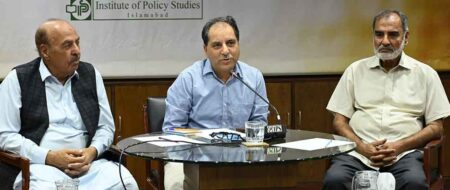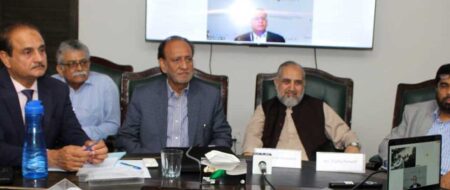Multiple Crises of the Empire: Challenges and Implications for the World
Dr. Robert W. Jensen, from School of Journalism, University of Texas US, and Mr. Justin Podur, from University of Toronto, Canada discussed the challenges and implications of the multiple crises of the empire in the seminar, which was held on July 16, 2008 and managed to attract a healthy audience of intelligentsia.
Activity: Public Seminar
Speakers: Mr. Justin Podur, University of Toronto, Canada; Dr. Robert W. Jensen, School of Journalism, University of Texas, US
Chair: Dr. Mumtaz Ahmed, Executive Director of Iqbal International Institute for Research and Dialogue
from its predecessors.
 Mr. Justin Podur, the first guest speaker, from University of Toronto, Canada categorized the crises of the contemporary empire in economic, ecological and cultural aspects. He impressed the audience by and in depth analysis of the “imperial economics as a system of plunder”, highlighting major strategies of propaganda, legal & political tools, and sheer force & terror used by the US to maintain its worldwide dominance. However, he defined the ecological problems and apathy of the consumption based society of the US as the main crisis of the Empire.
Mr. Justin Podur, the first guest speaker, from University of Toronto, Canada categorized the crises of the contemporary empire in economic, ecological and cultural aspects. He impressed the audience by and in depth analysis of the “imperial economics as a system of plunder”, highlighting major strategies of propaganda, legal & political tools, and sheer force & terror used by the US to maintain its worldwide dominance. However, he defined the ecological problems and apathy of the consumption based society of the US as the main crisis of the Empire.
Dr. Robert W. Jensen, from School of Journalism, University of Texas US, spoke about the spiritual and moral apathy of the people of the Empire, remarking that it was affluence and a strong sense of National superiority inculcated in common Americans that made them morally irresponsible and disdainful. He drew parallels with the supremist interpretations of Islam by various groups for their petty objectives. He was saddened by the “US’s trajectory to destruction” and pointed out the need to develop justice and sustainability, which he defined as a simple plea of decent lives.
 Chairing the seminar, Dr. Mumtaz Ahmed, Executive Director of Iqbal International Institute for Research and Dialogue, offered an alternative perspective to the pragmatic speeches of the guest speakers, pointing out how the US’s pursuit of Capitalism and other current policies had infact seen its influence grow throughout post world-war period even after precarious situations like the Vietnam War. The current dependence of Europe and pure economic pursuits of China, Mr Mumtaz maintained, allowed the US to entrench its position in the unipolar world.
Chairing the seminar, Dr. Mumtaz Ahmed, Executive Director of Iqbal International Institute for Research and Dialogue, offered an alternative perspective to the pragmatic speeches of the guest speakers, pointing out how the US’s pursuit of Capitalism and other current policies had infact seen its influence grow throughout post world-war period even after precarious situations like the Vietnam War. The current dependence of Europe and pure economic pursuits of China, Mr Mumtaz maintained, allowed the US to entrench its position in the unipolar world.
The speeches generated an interesting and intense question answer session, which led to a good debate about the alternatives and ways of resistance to the current US designs and systems which led to various crises. Dr. Justin closed the session strongly remarking that people should take up positive resistance in whatever capacity they can instead of celebrating others doing it. The audience was allowed to mingle with the speakers informally and they remarked that it was an excellent event.











